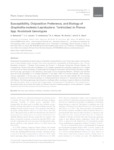Please use this identifier to cite or link to this item:
http://www.alice.cnptia.embrapa.br/alice/handle/doc/1073882Full metadata record
| DC Field | Value | Language |
|---|---|---|
| dc.contributor.author | BERNARDI, D. | pt_BR |
| dc.contributor.author | LAZZARI, J. C. | pt_BR |
| dc.contributor.author | ANDREAZZA, F. | pt_BR |
| dc.contributor.author | MAYER, N. A. | pt_BR |
| dc.contributor.author | BOTTON, M. | pt_BR |
| dc.contributor.author | NAVA, D. E. | pt_BR |
| dc.date.accessioned | 2017-08-10T11:11:11Z | pt_BR |
| dc.date.available | 2017-08-10T11:11:11Z | pt_BR |
| dc.date.created | 2017-08-10 | pt_BR |
| dc.date.issued | 2017 | pt_BR |
| dc.identifier.citation | Environmental Entomology, v. 0, n. 0, p. 1-7, 2017. | pt_BR |
| dc.identifier.uri | http://www.alice.cnptia.embrapa.br/alice/handle/doc/1073882 | pt_BR |
| dc.description | Studying the susceptibility of peach trees to Grapholita molesta (Busck) is one of the major steps in the develop- ment of pest-resistant peach varieties. This work evaluated the susceptibility of 55 genotypes of the "Prunus Rootstock Collection" ("Coleção Porta-enxerto de Prunus ") of Embrapa Temperate Climate (Pelotas, Rio Grande do Sul, Brazil) to the natural infestation of G. molesta , assessed the oviposition preference of G. molesta in choice and no-choice bioassays, and estimated the biological parameters and the fertility life table on different Prunus spp. genotypes in the laboratory. Genotypes Prunus kansuensis (Rehder), I-67-52-9, and I-67-52-4 were the most susceptible to G. molesta infestation in the field ( > 60% of branches infested), while 0 Sharpe 0 ( Prunus angustifolia x Prunus spp.) and Prunus sellowii (Koehne) were the least infested (0% of branches infested). In choice and no-choice bioassays, G. molesta preferred to oviposit on P. kansuensis when compared with Sharpe. The Sharpe genotype also showed an antibiosis effect, resulting in negative effects on the fertility life table parameters when compared with the genotypes P. kansuensis and 0 Capdeboscq. 0 The results found in the present study can provide information to initiate a long-term breeding program moving desired G. molesta resistance traits from the rootstock into the Prunus spp. cultivars. Keywords : Rosaceae, insect resistance, antibiosis, antixenosis, oriental fruit moth | pt_BR |
| dc.language.iso | eng | eng |
| dc.rights | openAccess | eng |
| dc.subject | Insect resistance | pt_BR |
| dc.subject | Oriental fruit moth | pt_BR |
| dc.title | Susceptibility, Oviposition Preference, and Biology of Grapholita molesta (Lepidoptera: Tortricidae) in Prunus Spp. Rootstock Genotypes. | pt_BR |
| dc.type | Artigo de periódico | pt_BR |
| dc.date.updated | 2019-05-06T11:11:11Z | pt_BR |
| dc.subject.thesagro | Inseto | pt_BR |
| dc.subject.thesagro | Grapholita molesta | pt_BR |
| dc.subject.nalthesaurus | Rosaceae | pt_BR |
| dc.subject.nalthesaurus | antibiosis | pt_BR |
| dc.subject.nalthesaurus | antixenosis | pt_BR |
| riaa.ainfo.id | 1073882 | pt_BR |
| riaa.ainfo.lastupdate | 2019-05-06 -03:00:00 | pt_BR |
| dc.identifier.doi | 0.1093/ee/nvx114 | pt_BR |
| dc.contributor.institution | Laboratory of Entomology, Embrapa Clima Temperado, BR 392 Km 78, Caixa Postal 403, Pelotas, RS 96010-971, Brazil (dbernardi2004 @ yahoo.com.b | pt_BR |
| dc.contributor.institution | Laboratory of Entomology, Embrapa Clima Temperado, BR 392 Km 78, Caixa Postal 403, Pelotas, RS 96010-971, Brazil (dbernardi2004 @ yahoo.com.br | eng |
| dc.contributor.institution | jose.cesarlazzari @ hotmail.com | eng |
| dc.contributor.institution | Department of Entomology, Federal University of Vic ?osa, Av. Peter Henry Rolfs, s/n, Vic ?osa, MG 36570-900, Brazil (andreazzafelipe @ yahoo.com.br) | eng |
| dc.contributor.institution | Laboratory of Entomology, Embrapa Clima Temperado, BR 392 Km 78, Caixa Postal 403, Pelotas, RS 96010-971, Brazil (dbernardi2004 @ yahoo.com.br | eng |
| dc.contributor.institution | jose.cesarlazzari @ hotmail.com | eng |
| dc.contributor.institution | alex.mayer @ embrapa.b | eng |
| dc.contributor.institution | MARCOS BOTTON, CNPUV | eng |
| dc.contributor.institution | DORI EDSON NAVA, CPACT. | eng |
| Appears in Collections: | Artigo em periódico indexado (CNPUV)  | |
Files in This Item:
| File | Description | Size | Format | |
|---|---|---|---|---|
| BottonEnvEnt2017.pdf | 273,97 kB | Adobe PDF |  View/Open |









